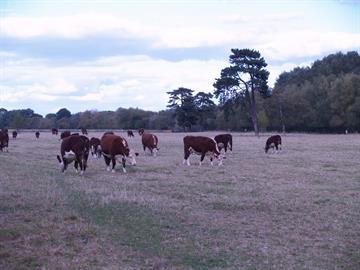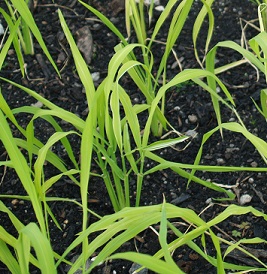Gain a solid foundation in agricultural science, practice and management.
 Learn about soil composition and the properties and nutritional value of soils.
Learn about soil composition and the properties and nutritional value of soils.- Undertake a practical project to evaluate soils and determine suitable management strategies for them.
- Learn about different types of pastures, and how to manage and evaluate pastures for development.
- Learn about managing water resources, and how to conserve, treat and reuse water.
- With the Research Projects in the course, students learn the process of determining research needs, searching for information, learning about research methodology, using statistics, conducting statistical research, preparing research reports and presenting a project.
- The Industry Project provides students with the opportunity to apply the skills and knowledge developed in the course to real world situation.
Develop your potential
The Advanced Certificate In Agriculture is a solid foundation of studies in agriculture, providing students with a grounding of knowledge to develop their careers in this sector. With the inclusion of Elective Modules the course enables students to tailor the learning package to their own areas of interest - focussing on their career goals and learning needs.
The course provides learning applicable to those looking to develop careers directly working in Farming and Agriculture, such as in -
- Farm Management.
- Farm Contracting.
Or in related industries, such as:
- Supplying agricultural equipment, supplies, or services to farms and farmers.
- Working in writing, the media, research, or education with regard to the farming industry.
In addition, this course is also ideal as a basis for further studies.
COURSE STRUCTURE AND CONTENT
The Core Modules
These modules provide foundation knowledge for the Advanced Certificate in Agriculture. Please follow the links in the module titles to access further information for each one.
Soil Management (Agriculture) BAG103
Pasture Management BAG212
Water Conservation And Management BEN302
Workplace Health & Safety VBS103
Industry Project BIP000
Research Project I BGN102
Research Project II BGN201
The Elective Modules
In addition to the Core Modules, students are to select and study any 2 of the following 36 modules.
 Agricultural Marketing BAG304
Agricultural Marketing BAG304
Agronomy BAG306
Agronomy II - Grains BAG309
Animal Anatomy And Physiology (Animal Husbandry I ) BAG101
Animal Behaviour BAG203
Animal Breeding BAG301
Animal Diseases BAG219
Animal Health (Animal Husbandry II) BAG201
Aquaculture BAG211
Aquaponics BHT319
Beef Cattle BAG206
Bookkeeping Foundations (Bookkeeping I) BBS103
Botany I (Plant Physiology And Taxonomy) BSC104
Calf Rearing BAG207
Carpentry BSS100
Conservation and Environmental Management BEN201
Dairy Cattle BAG205
Engineering I - Machinery and Equipment BSC105
Engineering II - Engineering Applications BSC205
Equine Behaviour BAG216
Farm Management BAG104
Goat Husbandry BAG223
Horse Breeding BAG307
Horse Care 1 BAG102
Horse Care II BAG204
Horse Care III BAG302
Irrigation (Agricultural) BAG213
Irrigation Management (Agricultural) BAG303
Natural Health Care for Animals BAG218
Organic Farming BAG305
Permaculture Systems BHT201
Pigs BAG209
Poultry BAG208
Sheep BAG210
Sustainable Agriculture BAG215
Weed Control BHT209
Note that each module in the Advanced Certificate in Agriculture is a short course in its own right, and may be studied separately.
Soil - A Key Element
 The utilisation of land for agricultural purposes, at any given time and in any location, is a highly complex matter that is governed by many different effects. The importance of soil in agriculture cannot be underestimated. Without it we would not be able to produce crops or raise animals.
The utilisation of land for agricultural purposes, at any given time and in any location, is a highly complex matter that is governed by many different effects. The importance of soil in agriculture cannot be underestimated. Without it we would not be able to produce crops or raise animals.
There are several thousand different types of soil throughout the world, a fact that is not surprising when bearing in mind the differences there are worldwide in the agents responsible for the building and forming of soil (landscape, climate, geology, vegetation, time and man).
Healthy and sustainable agricultural soils must balance a range of functions to meet the needs of both the farmer and the broader community.
Healthy soils must support and sustain soil biota and plant life, decompose organic matter, suppress pathogens, store and cycle water and nutrients, deactivate toxic compounds, and protect catchment water quality.
The proper management of soils is a crucial consideration in the long-term sustainability of agro-systems.
Many agricultural practices increase the soil’s vulnerability to degrading processes such as: acidification, erosion, salinisation, soil structure decline, and chemical contamination. The major challenge for the sustainable management of agricultural soils is to develop methods and production systems that prevent degradation, at the same time they actively promote and enhance soil health.
The ability to apply practices that will enhance soil health will vary with the type of agricultural enterprise, the climate of the area, the landforms and soil types; as well as the economic ability, education and attitudes of the farm management team.
HOW THE COURSE WORKS
You can start the Advanced Certificate in Agriculture at any time.
It is studied by distance learning, so you can study in the comfort of your own home. But this doesn't mean you are all alone in your studies. Our highly qualified Agriculture tutors are there to help you every step of the way. If you have any questions at all, they are always happy to help.
The course requires approximately 900 hours of study. It comprises a total of 9 Modules - 7 Core (compulsory) Modules plus 2 Elective Modules selected from the list shown above.
At the end of lessons in the modules, there are assignments for students to complete and submit to the School for marking by their tutor. The tutor will return the assignment to the student with their comments on their work and suggestions for any further reading that they consider will improve the students understanding of the subject.
In addition to successfully completing assignments in the modules, students will need to pass exams in all the relevant modules.
Your Next Step
Agriculture is an industry we all depend upon. There are skills shortages in many areas of agriculture.
- Study the Advanced Certificate In Agriculture to develop your knowledge and understanding, as well as an awareness of with developments in the industry.
- Improve your job and career prospects in agriculture.
- This course is suitable for the complete beginner or an experienced agricultural student who wishes to specialise in certain areas.
- The course enables you to specialise in a niche or general area and define your own career path with this unique qualification, and make your studies relevant to your goals.
You can enrol on the course today, but if you have any questions or would like to know more, our specialist Agriculture tutors will be more than happy to help.
Or